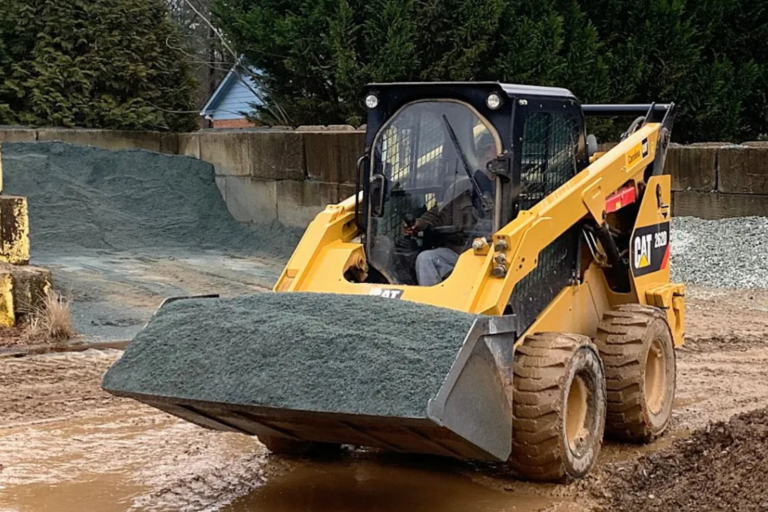In the world of commercial landscaping, reliability isn’t just a benefit; it’s a necessity. Every landscaping job hinges on the smooth operation of equipment, and any unexpected failure can lead to significant downtime, project delays, increased labor costs, and unhappy clients. As operations grow more frequent and complex, especially in the peak seasons, maintaining a full fleet of equipment becomes a cornerstone of efficiency and professionalism.
Equipment in commercial landscaping, such as mowers, trenchers, spreaders, compactors, and leaf blowers, often operates under intense conditions. Dust, moisture, heavy usage, and inconsistent terrain accelerate wear and tear. Without a proactive approach to maintenance, these machines will inevitably falter. Preventive and predictive maintenance measures can drastically reduce repair costs, prevent unscheduled outages, and prolong equipment life.
Andolina Materials, a leading provider of commercial landscaping supplies in Monroe, North Carolina, understands the critical role that well-maintained equipment plays in landscaping success. Whether you’re installing natural stone patios, laying organic topsoil, or spreading mulch on large-scale commercial properties, equipment reliability directly impacts the quality and timeline of the work.
This guide outlines top maintenance tips to prevent equipment failure and promote operational excellence for those involved in frequent commercial landscaping operations.
Regular Equipment Inspection and Daily Maintenance Routines
The first line of defense against equipment failure in any commercial landscaping operation is a consistent inspection routine. Before each job begins, crews should perform a visual inspection of every piece of equipment they plan to use. This includes checking for oil leaks, inspecting tire pressure, confirming belt tension, and looking for signs of wear such as cracked hoses or loose bolts.
For gas-powered equipment, checking engine oil levels, fuel integrity, and air filters should be a daily routine. Oil changes should be done as per the manufacturer’s specifications, especially during periods of heavy usage. Dirty air filters significantly reduce engine efficiency and are one of the leading causes of overheating and long-term engine damage. Ensuring they are cleaned or replaced regularly protects both performance and longevity.
Blade maintenance is another critical task. Mowers, edgers, and trimmers must have sharp, well-balanced blades to perform clean cuts. Dull knives not only produce inferior results but also force engines to work harder, increasing fuel consumption and accelerating wear. Weekly blade sharpening can be a simple yet powerful preventative measure.
Equipment cleaning is equally important but often overlooked. After each workday, cleaning off soil, mulch, grass clippings, and debris helps prevent corrosion and buildup in sensitive areas like cooling fins and air intakes. Excess moisture trapped under organic materials can lead to rust and affect functionality. Crews should be trained to wipe down and store equipment in dry, shaded environments when possible.
Creating standardized checklists for crews helps enforce accountability. When inspections are routine and documented, issues are identified early before they become expensive problems. That means fewer emergency repairs and more time spent delivering quality landscaping services.
Implementing Preventive Maintenance Programs
A preventive maintenance program is not just an industry best practice; it’s an operational strategy that yields measurable returns. For businesses engaged in frequent commercial landscaping projects, preventive maintenance is essential for optimizing uptime and reducing unplanned expenses.
Preventive maintenance schedules should be based on equipment usage, not just calendar dates. Commercial landscaping equipment often accumulates hundreds of hours of use in short periods, particularly during the spring and summer months. Tracking operating hours allows maintenance tasks such as spark plug replacement, oil changes, hydraulic checks, and lubrication to be performed at intervals that reflect actual usage conditions.
Andolina Materials supports many large-scale landscaping contractors who prioritize uptime. From delivering bulk mulch and gravel to supplying natural stone, our clients depend on their machinery to handle demanding installation processes. We consistently advise that they invest in simple maintenance tracking tools or maintenance software to monitor equipment health. These platforms enable operations managers to receive alerts, schedule service intervals, and maintain digital records of past maintenance, which aids in warranty claims and resale value.
In addition, storing equipment properly when not in use is a key component of preventive care. Covered, ventilated, and climate-controlled environments reduce exposure to harmful elements like UV radiation, water, and extreme heat. Fuel stabilizers can prevent clogs in small engines, while battery maintenance (checking charge and corrosion) ensures electric equipment remains reliable.
Routine testing of auxiliary parts, like safety switches, throttles, and kill switches, is equally important. These components often suffer from wear due to vibration or exposure, yet they’re vital for safe operations. Including these checks in preventive programs is an easy way to improve crew safety while reducing the chances of sudden breakdowns.
Preventive maintenance isn’t about reacting; it’s about anticipating and avoiding problems. Landscaping teams that adopt a proactive mindset will outperform competitors who rely solely on reactive, emergency repairs.
Predictive Maintenance and Monitoring for High-Usage Equipment
Predictive maintenance is an advanced strategy that goes beyond scheduled service intervals. It involves using condition-based data to assess equipment health and anticipate failures before they occur. For commercial landscaping companies managing high-frequency operations, this approach provides even greater control over uptime and resource allocation.
Through diagnostic tools and monitoring systems, predictive maintenance allows operators to track engine temperature, vibration patterns, oil viscosity, and battery life. Sudden spikes or declines in these parameters often indicate internal issues, such as worn bearings, low oil pressure, or ignition problems.
While not every small engine may justify a full sensor suite, heavy-duty equipment like skid steers, compact loaders, and stone cutters often benefit from predictive diagnostics. These machines are frequently used in commercial landscaping installations involving hardscape features, gravel distribution, or topsoil compaction. A malfunction mid-project can stall delivery timelines and lead to costly contract delays.
In practice, predictive maintenance doesn’t require excessive investment. Apps and handheld meters can track basic data, including run time, idle time, and alerts for critical failures. Integrated fleet management systems can centralize this data, allowing landscape business owners to make informed service decisions without the guesswork.
Incorporating predictive tactics helps reduce unscheduled downtime, improve safety outcomes, and better align equipment availability with job site needs. When every crew member is backed by functioning machinery, the result is consistent output, satisfied clients, and a solid reputation for reliability.
As a leading commercial landscaping materials provider, Andolina Materials has witnessed the positive impact of predictive practices among our clients. Companies that monitor and maintain their heavy-use equipment are more likely to deliver projects on time and under budget, and they tend to return to us regularly for restocking their mulch, gravel, sand, or stone without being sidelined by equipment trouble.
Equipment Storage, Seasonal Maintenance, and Operator Training
Effective equipment care doesn’t end at job completion. One of the most overlooked factors contributing to equipment failure is improper storage and handling during off-hours or in changing weather conditions. For businesses in North Carolina and similar climates, seasonal transitions can be harsh on stored equipment if not handled correctly.
Before storing any equipment for extended periods, whether over weekends, holidays, or off-seasons, proper cleaning and drying are essential. Fuel should be drained or stabilized, and oil changes completed to prevent old fluids from corroding engine parts. For battery-powered tools, batteries should be fully charged and stored in a dry environment to avoid discharging or swelling.
Moisture is one of the leading enemies of landscaping machinery. Covered storage areas, elevated pallets, and protective equipment covers help minimize corrosion risks. For equipment used with materials like mulch, sand, or organic topsoil, such as spreaders and compactors, thorough cleaning prevents material buildup that might harden and damage components over time.
Seasonal maintenance should also include blade replacement, spark plug inspections, tire inflation checks, and complete diagnostics to prepare for the upcoming season. Winterization procedures, especially for irrigation equipment or water-based machinery, are vital to prevent freezing and cracking of components.
Operator training is the final and perhaps most influential aspect of preventing equipment failure. Even the best-maintained tools can break down prematurely if used improperly. Training new crew members on how to start, operate, clean, and store equipment properly can drastically extend equipment lifespan. They should understand the sounds and performance cues that signal early trouble, such as strange vibrations, overheating, or inconsistent power output.
Experienced operators also tend to be more cautious with materials. For instance, spreading gravel or stone requires precision to avoid damaging gears, while laying mulch or topsoil evenly reduces stress on mechanical spreaders. Operators familiar with the proper handling of Andolina Materials’ commercial landscaping supplies not only protect their equipment but also ensure cleaner, more professional results on site.
Integrating seasonal routines with strong operator education creates a culture of care. Over time, this discipline reduces maintenance costs, enhances team accountability, and improves overall job efficiency.
About Andolina Materials
Andolina Materials is proud to support the landscaping industry with a wide range of high-quality commercial landscaping materials tailored to meet the needs of contractors and property managers throughout Monroe and the surrounding North Carolina areas. With over 15 years of experience, we provide top-tier mulch, gravel, sand, natural stone, and organic topsoil to help our clients execute flawless commercial landscaping projects. Our commitment to prompt delivery, exceptional customer service, and dependable product quality has made us a trusted supplier in the region. Whether you’re refreshing a retail property’s landscape or undertaking large-scale commercial installations, Andolina Materials is here to ensure you have the right materials delivered on time so your team can work efficiently, safely, and with confidence.




